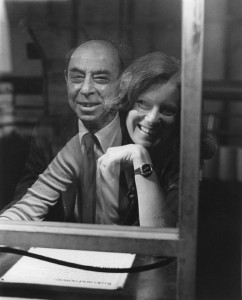“
K.C. Cole’s newly published biography of the ‘uncle of the atom bomb,’ as Frank Oppenheimer called himself, recounts the touching and sometimes tortuous relationship between Frank, Ernest Lawrence, and other physicists as they struggled to find a way to survive a nuclear age.”
Robert Oppenheimer’s little brother Frank was a gifted experimental physicist and a valuable member of Ernest Lawrence’s team at Berkeley Lab (then called the University of California’s Radiation Laboratory) in the years before and after World War II. Renowned science writer K.C. Cole visits Berkeley Lab on Friday, November 13, for a 12:30 talk in the Building 50 Auditorium about Frank’s unique contributions to the Lab and to the world of science and science education, which are colorfully described in her latest book: Something Incredibly Wonderful Happens: Frank Oppenheimer and the World He Made Up is a full-scale biography and a memoir of Cole’s longtime friendship with Frank Oppenheimer, with a foreword by Murray Gell-Mann.
The ever-mischievous Frank was in many ways the opposite of his quiet, cerebral, and “obnoxiously good” older brother Robert, the so-called “father of the atomic bomb.” Frank played a key role in uranium isotope separation, working with Ernest Lawrence on Berkeley’s 37-inch cyclotron and on building the 184-inch cyclotron and the isotope-separating Calutrons to which the 184-inch’s magnet was diverted.
After the war, Frank had a wild (if brief) career launching balloons carrying cosmic ray detectors from an aircraft carrier and then chasing after them through Cuban jungles after they landed. His experiments were early evidence that these particle showers contained the nuclei of virtually all elements. But his pre-war flirtation with communism got him blacklisted from physics, and he spent the 1950s raising cattle on a Colorado ranch (never mind that he dived in before he even knew what “hay” was) and teaching science to high school students in nearby Pagosa Springs.
Frank emerged from exile determined to create a “museum of human awareness” — the Exploratorium — an institution, now imitated world-wide, that combines art, science, and serious play in the hopes of promoting a worldview based on understanding and persuasion rather than coercion. It was Frank’s answer not just to the atom bomb, but also to the changes he found post-war in his beloved physics, which seemed to him to have lost its cultural bearings.
Based on Cole’s newly published memoir/biography of the “uncle of the atom bomb,” as Frank called himself, her talk will recount the touching and sometimes tortuous relationship between Frank, Ernest Lawrence, and other physicists (even Edward Teller liked and supported Frank) as they struggled to find a way to survive a nuclear age. It is also the story of how Frank created his “palace of wonders,” starting from virtually nothing – and how the author, then a young political writer who thought an “accelerator” was a gas pedal, stumbled on the marvelous Exploratorium and fell in love with physics.
K.C. Cole is a professor of science journalism at the University of Southern California’s Annenberg School for Communication and Journalism. Cole, described by Amazon.com as “the Leonardo da Vinci of science writing,” was a long-time science writer for the Los Angeles Times, where she ranged far afield but concentrated on physics, and her writing has appeared in the New Yorker, the New York Times, Smithsonian, the Columbia Journalism Review, Newsweek, Esquire, Ms., the Washington Post and many other publications; she has appeared frequently as a science commentator on public radio shows including Science Friday and Marketplace; and she created and hosts the salon-like Categorically Not! events at the Santa Monica Art Museum celebrating the intersection of art, science, politics, and “whatnot.”
Cole’s writing was featured in The Best American Science Writing 2004 and 2005, and The Best American Science and Nature Writing 2002. She is the author of eight books about science including The Universe and the Teacup: The Mathematics of Truth and Beauty — a national best-seller translated into a dozen languages — Mind Over Matter: Conversations with the Cosmos, based on her LA Times columns, The Hole in the Universe: How Scientists Peered Over the Edge of Emptiness and Found Everything, and First You Build a Cloud…and Other Reflections on Physics as a Way of Life. Her numerous awards include the American Institute of Physics prize for science writing, the Los Angeles Times award for Explanatory Journalism, the Edward R. Murrow Award for “thoughtful coverage of scientific controversies” from the Skeptics Society, and the Exploratorium’s public understanding of science award.
For more on Something Incredibly Wonderful Happens visit http://www.hmhbooks.com/catalog/titledetail.cfm?titleNumber=1098829
